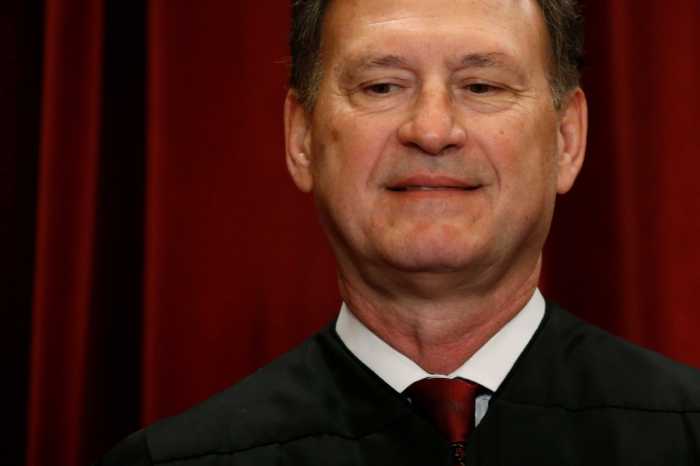US District Judge Matthew J. Kacsmaryk of the Amarillo Division of the US District Court for the Northern District of Texas issued an order on October 1 declaring the Biden administration’s interpretation of the Supreme Court’s 2020 Bostock decision to be unlawful, and vacating and “setting aside” the June 15, 2021, and March 2, 2022, guidance documents issued by the Equal Employment Opportunity Commission (EEOC) and the Department of Health and Humans Services’ Office of Civil Rights (OCR) articulating that interpretation. His order also provided that the State of Texas, which challenged the Biden interpretation, can move to recover “reasonable attorney’s fees and court costs.”
Kacsmaryk, who was appointed to the district court in 2018 by President Donald J. Trump after a party-line confirmation vote in the Senate, was particularly selected by the plaintiff, the State of Texas, to hear this case, in a blatant example of judge-shopping by filing their complaint in the Amarillo division of Dallas-based district court, where he is the only district judge. His nomination had stirred controversy, especially among LGBTQ groups concerned with judicial nominations, because of statements he had made about homosexuality (as “disordered”) and transgender status (as “delusional”) during his involvement in religious freedom cases, including an amicus brief he signed in support of the Masterpiece Cakeshop baker who refused to design a wedding cake for a gay couple.
The Supreme Court released its decision in Bostock v. Clayton County, Georgia, on June 15, 2020. Bostock combined cases from three federal circuit appeals courts involving Title VII sex discrimination claims by employees discharged because they were gay or transgender. Writing for a 6-3 majority of the Supreme Court, Justice Neil Gorsuch held that it is impossible to discharge a person because of their “sexual orientation” or “transgender status” without taking account of their sex, thus implicating the ban on discrimination “because of sex” under Title VII. In a strongly worded dissenting opinion, Justice Samuel Alito, as described by Judge Kacsmaryk, “famously warned the majority’s opinion was like a ‘pirate ship,’ sailing under a textualist flag but wreaking havoc on over 100 federal statutes prohibiting ‘sex’ discrimination.” Responding to this in the majority opinion, Justice Gorsuch said that the court was ruling only on the question presented by the case — whether a gay or transgender person could contest their discharge as “discrimination because of such individual’s sex” under Title VII — and was not ruling on issues arising under any other statute or on the various other issues Alito had mentioned in his dissent, such as restroom access, women’s sports, housing, employment by religious organizations, healthcare (in particular gender transition procedures), freedom of speech, or constitutional claims.
The Trump administration, which had argued in favor of the employers’ positions in Bostock, reacted to the Supreme Court’s opinion by insisting that it was a narrow ruling that would not affect the administration’s positions on other statutes or the various issues identified by Alito’s dissent. But the Biden administration, on taking office in January 2021, took the opposite position in an executive order signed by President Joe Biden on his first day in office. Biden directed all federal agencies concerned with sex discrimination to review all their policies in light of the Bostock ruling to provide protection against discrimination for LGBTQ individuals.
The chair of the Equal Employment Opportunity Commission (EEOC), Charlotte Burrows, responded to this directive on June 15, 2021, issuing what she called a “technical assistance document” to advise the public about how the EEOC was interpreting Bostock to be consistent with the EEOC’s “established legal positions on LGBTQ+ related matters, as voted by the Commission.” This was referring to rulings by the commission in federal sector discrimination cases during the Obama administration that found gender identity and sexual orientation claims to be covered by Title VII, which rulings had not be disturbed during the Trump administration and were accepted by several federal courts even before the Supreme Court ruled in Bostock. On September 20, 2021, the State of Texas sued the EEOC and Commissioner Burrows in Judge Kacsmaryk’s court, also naming Attorney General Merrick Garland as a co-defendant, since the Justice Department has an enforcement role under Title VII.
On March 2, 2022, OCR responded to Biden’s directive, issuing a “Notice and Guidance” to inform the public of its policy, in reliance on Bostock, about “federal civil rights protections that apply to gender affirming care,” apparently going a step further than the Obama administration had gone. The Obama administration had taken the position that Section 1557 of the Affordable Care Act should be interpreted to ban discrimination in health care because of a person’s gender identity, but had not explicitly opined that this meant that coverage of gender-affirming care was required to comply with the ACA. This new guidance document also asserted that the Americans with Disabilities Act and Section 504 of the Rehabilitation Act of 1973 might treat gender dysphoria as a disability and prohibit discrimination on that basis, a position that has been rejected, with a few notable exceptions, by lower federal courts. Reacting to this new development, the State of Texas filed an amended complaint, adding HHS Secretary Xavier Becerra and OCR Director Lisa Pino as defendants.
The federal government moved to dismiss the case, but Judge Kacsmaryk rejected that motion almost entirely in May 2022. The plaintiffs and defendants both then moved for summary judgment, indicating their beliefs that this case could be decided as a matter of law without the need for a trial of facts. The plaintiffs asked the court to declare the June 15 and March 2 “guidance” documents to be unlawful, to order that they be vacated and set aside, and to enjoin enforcement and implementation of the “guidances.” They disputed the Biden administration’s interpretation of Bostock, and contended that both documents engaged in substantive rule-making without going through the necessary steps under the Administrative Procedure Act (APA) of publishing proposed rules, receiving public comment, and responding to the public comments and publishing final rules in the Federal Register. They contended that Commissioner Burrows could not issue the June 15 “technical assistance document” without getting a vote of the Commission (which still had a Trump-appointed majority at the time she issued that “guidance.”) They also contended that the June 15 Guidance violated the First Amendment by compelling employers to use pronouns consistent with employees’ gender identity and, by application to state agency employers, violated the 11th Amendment rights of the states.
Judge Kacsmaryk accepted most of the plaintiff’s arguments. Although both EEOC and OCR had stated that these were “guidance” documents that reflected agency interpretations but were not binding statements of agency law, Kacsmaryk rejected that defense, pointing to the mandatory wording appearing elsewhere in the “guidances” which convinced him that these agencies were adopting substantive rules. Although he rejected the plaintiff’s constitutional claims, or the contention that the EEOC’s June 15 guidance was “arbitrary and capricious,” he found that the March 2 guidance failed the arbitrary and capricious test under the APA. He agreed with the plaintiff that Commissioner Burrows violated EEOC procedures by issuing the June 15 guidance without a vote by the Commission, which would be required for the adoption of new substantive rules, as he characterized them.
Most significantly, however, Judge Kacsmaryk rejected the Biden administration’s overall view that the ruling in Bostock could be interpreted to apply broadly beyond the narrow issues specified by Justice Gorsuch in his opinion for the Supreme Court. He focused on the exact wording of Gorsuch’s opinion, which he pointed out had repeatedly referred to “status” and not “conduct.” He interpreted Gorsuch’s disclaimers responding to Alito as depriving the opinion of such a broader meaning, observing that Gorsuch wrote that the court was not making a judgment on the numerous issues that might arise as a result of its decision, such as restroom access, healthcare coverage, and the other issues mentioned in Alito’s dissent. As such, wrote Kacsmaryk, it was inappropriate for the EEOC or OCR to claim that they were just interpreting the Bostock decision in their “guidances” by directing employers that they had to cover gender-affirming care in their health plans, allow people to use restrooms consistent with their gender identity, or use the pronouns claimed by transgender people. His opinion purported to distinguish away all the prior court decisions cited by the defendants to support the broader interpretation of Title VII.
Kacsmaryk’s decision conflicts with numerous decisions issued by other district courts after the Bostock decision, as well as some court of appeals opinions. The Supreme Court has yet to address the issues that Gorsuch and Alito sparred over in the opinion and dissent, but this case seems calculated to get these issues to the Supreme Court if the administration decides to appeal Kacsmaryk’s ruling to the very conservative Republican-dominated Fifth Circuit Court of Appeals, which is likely to affirm some or all of it. If by some chance the Fifth Circuit reverses Kacsmaryk, and Governor Gregg Abbott and Attorney General Ken Paxton are re-elected, the state would certainly petition the Supreme Court for review.
Although Kacsmaryk issued a declaratory judgment order, he denied the state’s request for an injunction against the defendants. He explained in a footnote, “Plaintiff did not brief factors relevant to the appropriateness of injunctive relief.” Incorporating a quote from another court opinion, he continued, “’It is not the court’s job to divine the applicable law for the parties,’ nor is it the Court’s job ‘to manufacture every possible argument [Parties] could conceivably make.’” “Oops,” as former Texas Governor Rick Perry once said to explain a presidential nomination debating lapse when he forgot which federal department he was proposing to abolish in his campaign position papers!

















